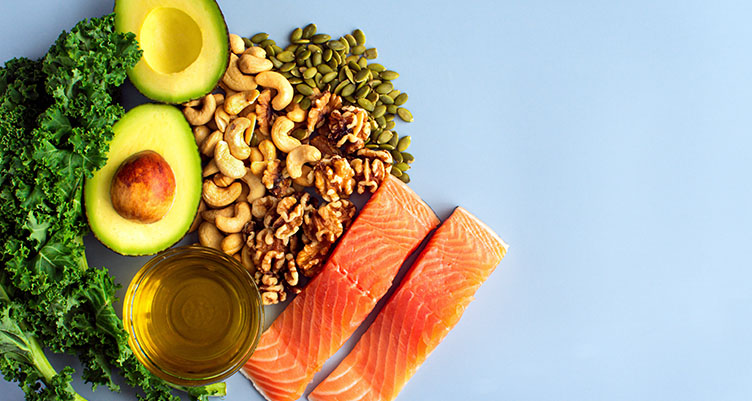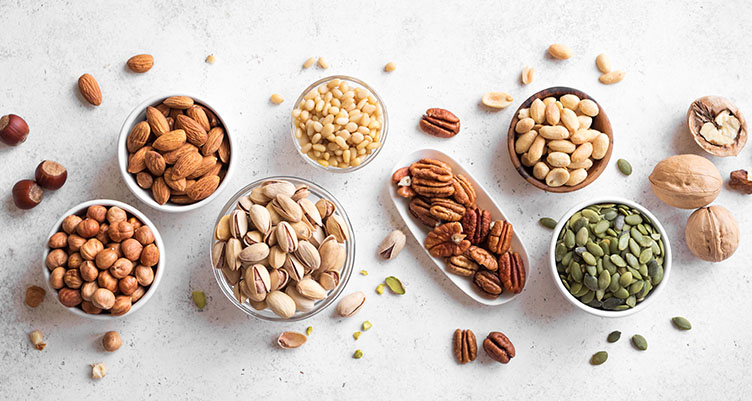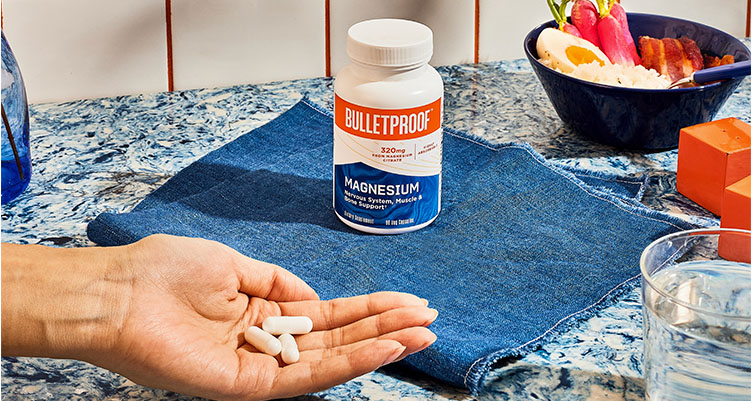10 Foods High in Magnesium: Add These Power Foods to Your Diet

- Magnesium is an important mineral that supports many processes in the body.
- Since magnesium isn’t produced in the body, we get it through magnesium-rich foods and dietary supplements.
- Foods high in magnesium include nuts, seeds, leafy greens, whole grains and legumes.
Calling magnesium “essential” is putting it lightly. This magnificent mineral supports more than 300 chemical reactions in the body. These range from muscle and nerve function to regulating blood sugar levels to lowering blood pressure.[1]
Despite the importance of magnesium, many people don’t get enough of it. And since the body can’t make magnesium, you must get it from outside sources, such as your diet and magnesium supplements. Read on to learn more about magnesium’s role and 10 magnesium-rich foods.

The Importance of Magnesium
To put it simply, magnesium matters. It’s an essential mineral that helps the organs in your body function correctly. If you didn’t have it, you would be tired and lethargic. Your muscles and nerves wouldn’t work properly and your blood sugar levels would be out of whack.
Magnesium also activates vitamin D to help grow and maintain healthy bones.[2] Given these creds, it makes sense that magnesium may also prevent disease.
A meta-analysis found that a high magnesium intake may help reduce the likelihood of a stroke.[3] Another meta-analysis found that magnesium may reduce the risk of type 2 diabetes by 22 percent.[4]
Since magnesium is available in many foods, a few tweaks to your diet can help you make sure you’re getting enough of this important mineral.
You can also get magnesium through supplements. Some medications, such as
laxatives and antacids, also contain magnesium.
How Much Magnesium Should I Take?
The recommended daily intake for adults varies by age and gender. According to the National Institutes of Health, the recommended intake for adult women is 310 to 320 milligrams of magnesium per day. For adult men, it is 400 to 420 milligrams of magnesium per day.[5]
You may struggle with magnesium deficiency if you have an underlying health condition. These might include type 2 diabetes, celiac disease and alcoholism. If you’re active, you also need to watch your magnesium intake. That’s because this important mineral depletes through sweat.
A blood test can determine if you’re deficient. Listening to your body also provides some clues.
Look out for these signs of low magnesium[6]:
- Fatigue or weakness
- Muscle cramps
- Numbness
- Nausea
- Constipation
- Brain fog

Foods High in Magnesium
Magnesium-rich foods cover a wide variety of major food groups, including[7]:
- Nuts
- Seeds
- Leafy greens
- Legumes
- Soy products
- Whole grains
- Seafood
- Fruits
- Protein
- Dairy products
Here’s a closer look at some of these food groups:
Nuts and Seeds
If you’re champing at the bit to reap the benefits of magnesium, then chomp on nuts and seeds. The ones highest in magnesium include pumpkin seeds, almonds, chia seeds and cashews.
Brazil nuts are another nut that deserves to make it into the trail mix bag. A 1-ounce serving contains more than 25 percent of your recommended intake of magnesium.[8] Eat in moderation. Brazil nuts contain high levels of selenium.
Leafy Greens
From smoothies to salads to green juices, leafy greens are popular because they contain nutrients. One of these minerals is magnesium. Large amounts can be found in spinach, kale, collard greens and Swiss chard.
A hundred grams of spinach contains 93 milligrams of magnesium.[9]
As superfoods, leafy greens are abundant in other health benefits. These include reducing the risk of heart attack, stroke and certain cancers.[10]
Eating your greens may even support brain function as you get older.[11]
Legumes
Legumes are plant-based sources of protein. They are nutrient-dense in many vitamins and minerals, including magnesium.
The best ones to stock in your kitchen include:
- Black beans: more than 70 milligrams of magnesium per cup
- Chickpeas: 158 milligrams of magnesium per cup[12]
- Edamame: almost 100 milligrams per cup[13]
Soy Products
Soy products high in magnesium run the gamut of tofu, tempeh and soy milk.
Tofu is a staple food in many vegetarian diets. It’s a great meat substitute for those needing more protein. It’s also rich in magnesium: 81 grams contains 47 milligrams.[14]
If you were to eat 100 grams of tofu, you’d get 13 percent of the recommended daily intake of magnesium. Soy milk is another good choice. One cup of unsweetened soy milk contains 38.9 milligrams of magnesium.[15]
Whole Grains
Brown rice, bran cereals, quinoa and wheat germ are all main sources of magnesium. A cup of long-grain brown rice delivers 78.8 milligrams of magnesium to your plate.[16]
Aside from a mighty dose of magnesium, whole grains are essential to good health. Research has found that the fiber in whole grains may prevent blood clots from forming. It may also reduce the risk of heart attack and stroke.[17]
Seafood
Seafood is the perfect catch. Various types are high in protein and nutrients, including magnesium. Salmon contains 106 milligrams per medium filet.[18]
Other fatty fish containing hefty doses of magnesium include mackerel, halibut and oysters.
Another reason to get hooked? Seafood is one of the best sources of omega-3 fatty acids. Research has found that eating at least two servings per week may support heart health and soothe inflammation.[19]
Fruits
Various fruits such as avocado, bananas and dried figs are tasty sources of magnesium.
- Avocados: One medium avocado contains 58.8 milligrams of magnesium.[20]
- Bananas: One large banana contains 36.7 milligrams of magnesium.[21]
- Dried figs: One cup of dried figs contains 101 milligrams of magnesium.[22]
Protein
Lean meats such as chicken, turkey and lean pork provide a steady supply of magnesium with each bite. Take chicken breast for size—100 grams contain 26.2 milligrams of magnesium. This is 8 percent of the daily value.[23]
An unlikely protein and magnesium source is peanut butter. A single tablespoon contains a whopping 27 milligrams of magnesium.[24]
Dairy Products
Dairy products may be known for their high calcium content. But they are also high in other necessary minerals and nutrients.
Milk and yogurt are two of the magnesium heavy hitters:
- Milk: A cup of non-fat milk has 27 milligrams of magnesium (non-fat milk contains more magnesium than whole).[25]
- Yogurt: One cup of yogurt contains 29.4 milligrams of magnesium.[26]

Magnesium Supplements
Magnesium is having a moment. All over social media, people claim that it can help with everything from stress to sleep to brain fog. White magnesium isn’t a miracle cure, there is research behind these supplements to prove they are beneficial.
The most popular magnesium supplements include:
- Magnesium oxide: It is one of the most common forms of magnesium supplementation. It treats constipation[27] and migraines.[28]
- Magnesium citrate: It is a form of magnesium that contains citric acid. It is also considered one of the most absorbable forms of magnesium.
- Magnesium chloride: It helps treat low levels of magnesium and may improve sleep.[29]
How do you choose the best magnesium supplement? If you’ve decided to take a magnesium supplement, choose a trusted brand. For example, Bulletproof’s magnesium is made with high-quality magnesium citrate. Some of the benefits include nerve and muscle support and stress reduction.
How much magnesium do you need per day? It’s recommended to stay within the general intake for your age and gender. The best time to take magnesium is any time that works for you. Since magnesium works better the longer you take it, you want to develop a consistent habit.
However, if you’re taking magnesium for sleep, it may be best when taken 30 minutes before bedtime.[30]
Magnesium is an essential mineral that helps the body function. Foods high in magnesium include whole grains, leafy green vegetables, nuts, seeds and fruits. As amazing as magnesium-rich foods are, the body only absorbs around 30 to 40 percent of the magnesium in these foods.
Magnesium supplements can help fill the gaps. Magnesium supplements can vary in benefits, intended uses and how they’re absorbed. Speak to your doctor to determine if a magnesium supplement is right for you.
Sign up for early access to sales, product launches, the latest Bulletproof news and more!



